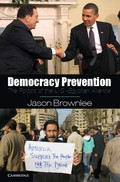Introduction
Published online by Cambridge University Press: 05 November 2012
Summary
In July 1980, a dozen F-4 fighter jets traveled from Moody Air Force Base, Georgia, to Cairo West, where they would fly in joint U.S.-Egyptian maneuvers. Operation Proud Phantom was the U.S. Air Force's first tactical deployment to Egypt, and it symbolized the two governments’ nascent partnership. An aerial photo of Egyptian- and U.S.-piloted F-4s passing the pyramids conveyed, in the words of one National Security Council (NSC) staffer, “the sense of cooperation and benefits to regional states that we have emphasized throughout the security framework.”
The framework, designed to counter Soviet influence in the Persian Gulf and absorb the aftershocks of Iran's revolution, almost collapsed the following year during Egypt's “Autumn of Fury.” Egyptians faulted President Anwar Sadat for mismanaging the economy, hoarding power, and accepting a bilateral treaty with Israel that enabled Israeli aggression instead of bringing regional peace. Rather than answering these objections, the embittered ruler jailed fifteen hundred of his critics. But a small band of militants struck back. During an October 6, 1981, ceremony – which commemorated Sadat's military success eight years prior – they shot and killed the president. The assassins took Sadat's life, but they did not upset Egypt's role in U.S. geostrategy. Vice President Hosni Mubarak succeeded to the presidency, and his counterpart in Washington, Ronald Reagan, fortified the U.S.-Egyptian alliance by increasing military aid.
- Type
- Chapter
- Information
- Democracy PreventionThe Politics of the U.S.-Egyptian Alliance, pp. 1 - 14Publisher: Cambridge University PressPrint publication year: 2012



